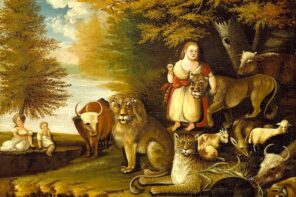Our last genius, Stephen Hawking, died early Wednesday morning at his home in Cambridge, England at the age of 76. Scientific genius may trade in sober objectivity, logical proof, and rational explication, but true to its intellectual origins as a type of secularized sainthood (celebrating intellectual acumen rather than holiness) it trades in the comforting patterns of superstition like any other human system. Which is just a way to mark that it’s appropriate Hawking passed on Albert Einstein’s birthday (as Isaac Newton had been born the year Galileo died).
Appropriate because Einstein and Hawking are fused in the popular imagination as twin titans of brilliance, for not dissimilar reasons. They are veritable brands as well as thinkers—Einstein’s mad explosion of hair and his rumpled clothes projecting the demeanor of a mind so consumed with contemplation that he has no time for mere appearance; Hawking even more dramatically the quadriplegic victim of ALS, the poetic image of a brain able to pass the event horizon of a black hole and approach its singularity while imprisoned in an atrophied body.
Both examples illustrate a type of Cartesian myth, demonstrating our faith in that strict split between mind and body, and our valorization of the imaginative power of the former over the later. It does no disservice to the intellectual accomplishments of either man to admit that these narratives are rightly part of why they are both celebrated, and to understand that the function of the “genius” for our era has much the same significance and meaning that concepts like “saint,” “prophet,” and “mystic” had for past ages.
Genius, like all concepts, has a history—and a particularly recent one at that. If antiquity had her seers, her seekers, and her saints, then modernity rather enshrined the myth of the solitary and brilliant mind, who, through his very genius, could illuminate the contours of creation. As Denis Diderot wrote in his voluminous Encyclopedia, “the genius seems to change the very nature of things; his character envelops whatever it touches; he casts into the future his piercing lights; he leaps ahead of his century, and it is powerless to follow him.”
Such a contention is separate from the reality that there have always been (and hopefully always will be) individuals who combine talent, drive, and luck into that potent cocktail we call “genius,” for the reality is that such a category has always been culturally determined and socially constructed. Furthermore, there is no separating the idea of genius from its attendant presuppositions and stereotypes; that the canon of geniuses has historically been white and almost always male isn’t, of course, because there’s a deficit of brilliant men and women of color, but rather because cultural gatekeepers have only expected to find genius among people who conform to a particular model.
But that model has a relative history as well, for figures like Plato and Aristotle, Augustine and Aquinas, may have been celebrated as great intellects, but there was always the supernatural gloss of “inspiration” behind their accomplishments. The Latin term genius after all, refers to a type of external spirit inspiring the individual, but with the Enlightenment it was conflated with the word ingenium, the innate and intrinsic talents of the exemplary individual themselves. The result was something close to the modern ideology of the genius, the secular saint who is able to conceive of visions beyond black holes, and the poetry of mathematics.
Genius was germinated as part of the humanistic Renaissance celebration of the individual, such as with Giorgio Vasari’s biographies of the great Italian artistic masters, but genius arguably fully sprouted in the eighteenth-century, when the poet Alexander Pope could write “Nature, and Nature’s laws lay hid in night:/God said, Let Newton be! And all was light.”
The human mind was no longer shaped by divine force, rather it was that which explicated nature, created it even. A need for geniuses arises during the Enlightenment, child of the Reformation and its process of disenchantment, because in an increasingly secular world people still desired that connection with the noumenal that oracles and prophets had once supplied, to give “assurance that special beings still animated the universe,” as historian Darrin M. McMahon explained in his Divine Fury: A History of Genius. He explains that they were “Wonders themselves, they made the world wondrous with their revelations and creations…. Geniuses reassured that the universe was still a magical place.”
Even though literary and artistic aptitude was sometimes described as such—think of Mozart or Goethe—in popular parlance the seeming objectivity of science has always made it the domain of the genius. Of course science as both process and method operates in a much slower and more humdrum way than the Archimedean image of the scientist yelling “Eureka!” in a fit of daemonic inspiration. As philosopher of science Thomas Kuhn wrote in his 1962 classic The Structure of Scientific Revolutions, the “scientific enterprise as a whole does from time to time… open up new territory… and test long-accepted belief. Nevertheless, the individual engaged on a normal research problem is almost never doing any one of these things.”
Even Newton, arguably the first universally celebrated scientific genius, for whom relics were made of his apocryphal apple tree and whose pronouncements were treated as oracular truths, admitted to the collaborative, collective, and methodical nature of his enterprise, writing that “If I have seen farther than others, it is because I stood on the shoulders of giants.” And yet we can’t help but be intoxicated by the theophanies of solitary genius: Newton beneath the apple tree, Einstein conceiving of special relativity while biking along Lake Como, or Hawking conceiving of the quantum radiation which bears his name as he sits in his wheelchair.
The idea of genius would be with us for nearly the next four centuries, though perhaps that reign is near its end. When I argue that Hawking was the last of the geniuses, I do not mean that there are no individuals who share his rare gift, only that they don’t serve the same cultural function that he did. Any number of Nobel laureates or physics professors presumably share Hawking’s talents, but the names Edward Witten, Steven Weinberg, Kip Thorne, Fabiola Gianotti, and Lene Hau are not part of popular culture as Hawking was; they don’t have cameos on Star Trek: The Next Generation, The Simpsons, and The Big Bang Theory. Their images are not short hand for brilliance or their names incantations for divine inspiration, for they are rather the dutiful workers in the scientific method dedicated to the furtherance of empirical knowledge (as Hawking was as well, of course).
Even the great popularizers of science, Carl Sagan, Stephen Jay Gould, and Neil deGrasse Tyson aren’t as synonymous with genius as Hawking, for even though they were (and, in the case of Tyson, are) the public face of science, permeating the culture in a manner similar to Hawking, they occupy the realm of intelligent interpreter more than they do inspired genius. If there’s a type of translatio of genius from Newton to Einstein to Hawking, then it’s hard to see who will take up that mantle, if such a mantle even still exists.
The eclipse of the ideal of the genius is simultaneously hopeful and worrying. Hopeful for it perhaps signals a democratization of understanding our fellow men and women, to “protect us from the impulse to raise idols and to bow and scrape before them,” as McMahon puts it; but worrying because the rejection of genius may also entail the rejection of fact. For, as the eighteenth-century marked the shift of an “episteme,” as Michel Foucault would put it, from the divine ideologies of the pre-modern era to the scientific ones which dominated our contemporary age, then it seems that we’re (perhaps worryingly) on the cusp of an era where truth is conceived of in some new and different way.
That there is no obvious inheritor of Hawking’s mantel doesn’t mean that one might not emerge. but if there’s no clear man or woman to take his place in the public’s conception of genius it could in part be due to the distrust many hold in objectivity, knowledge, and rigor. Genius may have always been a beautiful fiction, but it was an illuminating and important one, signifying enchantment in an otherwise disenchanted world.

This may be the best way to honor Hawking, our last genius—to remember that if the idea of genius evolved to preserve wonder, that we must do our best to develop new constructions and new ideas to best encapsulate wonder in whatever era we are heading into. Perhaps even more importantly, it’s to expand how we envision genius, and to see and recognize it where we find it. For example, the astrophysicist Neil deGrasse Tyson is a welcome figure, not just for his deft explanations of complex phenomena, but because as an African-American man he helps to expand the public’s perception of what genius looks like. A goal in the spirit of the physicist who passed today.
Hawking’s sayings are making the rounds in the form of articles and internet memes, more evidence of his station in the cultural firmament. One of the simplest but most moving of these was his advice that we should “Remember to look up at the stars and not down at your feet. Try to make sense of what you see and wonder about what makes the universe exist. Be curious.”
If wonder were the provenance of the mystic and then the genius, at least wonder was to be preserved. And if wonder is in the stars, then it’s also among our fellow men and women; let us recognize genius there among communities that have been overlooked. Let us try and ensure that there is a continuity in that, that whatever future ages may bring we still look at the stars, and it shall be because we will realize that we all stand upon the shoulders of giants, and that there are more giants amongst us than we commonly realize.





